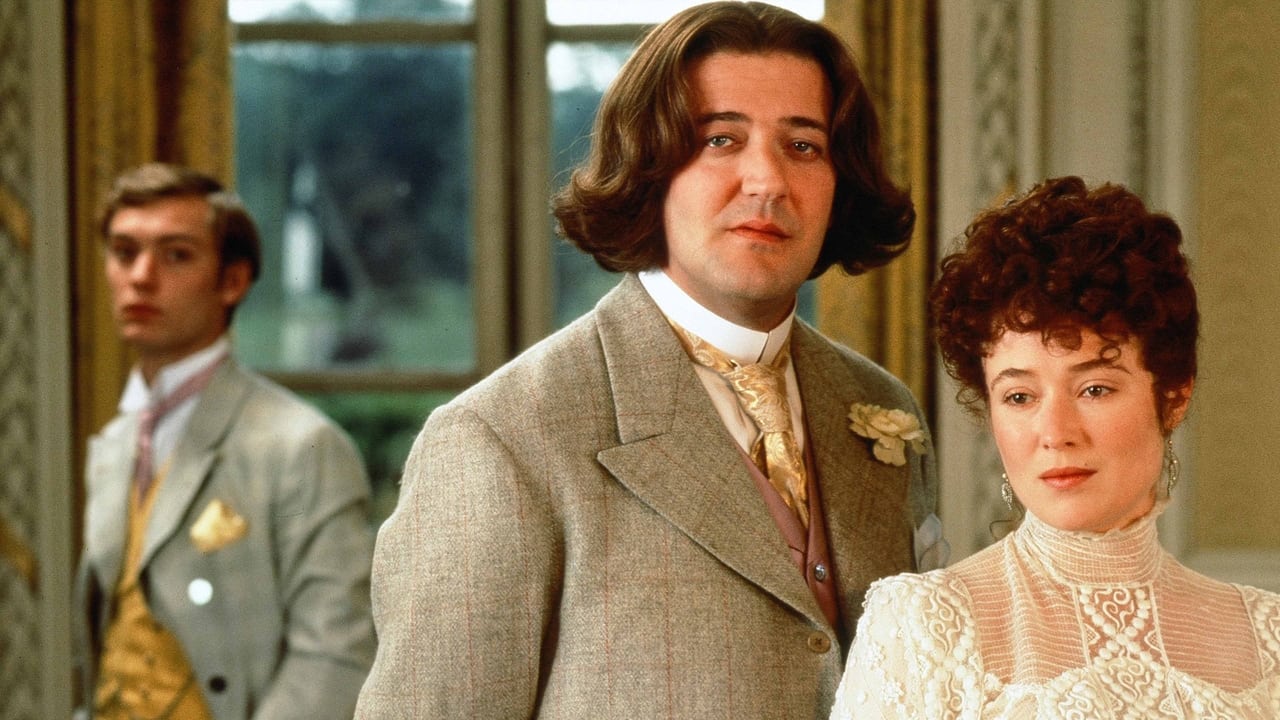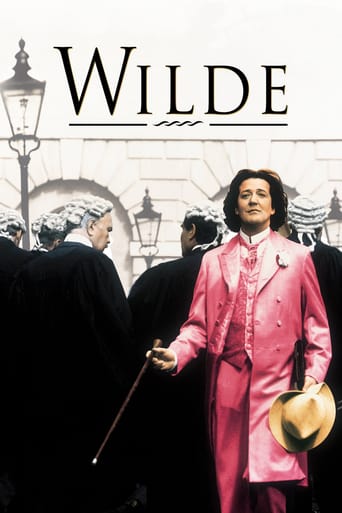

Just perfect...
... View MoreClever and entertaining enough to recommend even to members of the 1%
... View MoreThis is a small, humorous movie in some ways, but it has a huge heart. What a nice experience.
... View MoreThe storyline feels a little thin and moth-eaten in parts but this sequel is plenty of fun.
... View More'Wilde' is the 1997 film biographical film of the legendary playwright, author and poet, whose career was cut short after being prosecuted for being a homosexual in 19th century England. It stars the enormously versatile Stephen Fry, who bears a striking resemblance to the actual Oscar Wilde found in old photographs taken of him. Jude Law, who plays Wilde's lover, Lord Alfred Douglas (aka 'Bosie'), also resembles the real 'Bosie' of history. The 1997 version towers over the 1960 film starring Robert Morley, who was completely miscast as the sensitive Wilde.One of the main objections to this new 'artistic version', is that not enough attention was paid to Wilde's professional career as a writer. May I respectfully disagree with these opinions? If one wants to find out about Wilde's career as a writer, why not go and read 'The Picture of Dorian Gray' or watch 'The Importance of Being Earnest'? There is nothing inherently dramatic about his rise to the top in the literary circles he moved in. What is FAR MORE dramatic, is the whole history of Wilde's fall from grace, following his malicious prosecution by an intolerant Victorian society.Another objection from critics on the internet, is that there's too much emphasis here on Wilde's moments of intimacy, particularly with Bosie. Ignoring those prurient souls who find any images or suggestions of gay sex to be abhorrent, a case can be made that those scenes emphasizing Wilde's sexual proclivities, do slow the film down in the first half. On the other hand, by refusing to ignore them, screenwriter Julian Mitchell, has faithfully rendered Wilde's desires as well as his compulsions.The first half of 'Wilde' indeed is quite slow, as most of the real 'drama', doesn't kick in, until the second half. In the first half, we're introduced to Wilde's caring wife and two children, along with Bosie and how Wilde gradually becomes enamored with him. The danger Mitchell almost falls into, is making Wilde into too much of a nice guy. As it turns out, Mitchell makes it clear that Wilde did have his Achilles heel. And that of course was Bosie. Why did the brilliant and sensitive Wilde, fall for a lout like Bosie? Clearly, the younger man is continually unfaithful and goes as far as attending orgies, where he has sex with other men, and Wilde has no guilt feelings about playing the part of voyeur. There was obviously something that Wilde saw in Bosie and chose to concentrate on the good points and not the bad. On the other hand, Wilde did indeed recognize that Bosie was quite troubled, but due to his good nature, forgave him, arguing that his unfaithful lover couldn't help himself, due to being victimized by an abusive father.Wilde is much more than a story about a great writer. The prosecution of Oscar Wilde is a seminal moment in the history of society's attitude toward homosexuality. In the modern era, the trial of Oscar Wilde marked the beginning and the Stonewall Riots, perhaps marked the end of society's non-acceptance of homosexuality. The most absorbing part of 'Wilde' is the conflict that develops between Bosie's father, the Marquess of Queensbury, who accuses Wilde of corrupting his son. As it turns out, Wilde falls into the trap that Bosie's father has set for him: he sues him for criminal libel, ignoring friends' advice that the father's accusations that he actually engaged in sex with men, were true. Wilde's poetic defense of himself during the trial, sadly holds no weight, as the Victorian judge and jury, make it clear that they no have tolerance for Wilde's behavior, regardless of his motives.'Wilde' is a very well made, artistic film, that does an excellent job of recounting Oscar Wilde's personal history and sad, public fate. If you're willing to tolerate a slow-moving first half, you will be rewarded at film's end, which emphasizes the tragedy of a brilliantly talented man, whose career was cut short, due to a society which wasn't ready to accept him, merely on the basis of his sexual predilections, alone.
... View MoreI was really looking forward to seeing this film, as I am very fond of Oscar Wilde's work. The Importance of Being Earnest is absolutely delightful, and The Selfish Giant I fell in love with on first hearing at primary school and still have affection for it. So what did I think of Wilde? Seriously, I think this film is wonderful. It is the sort of film that is very thought-provoking, intelligent and desperately sad. The exploration of male love is quite graphic and it mayn't be to everyone's tastes, but I thought it was done with real sensitively and care.Wilde certainly looks beautiful- the scenery is striking, the cinematography is breathtaking and the costumes are wondrous. Another asset I loved was the music score, it was absolutely gorgeous, almost reminiscent of a John Barry score. I also feel it is underrated too, very touching and really gives the film the emotional punch it has. Wilde is also beautifully written, the references to The Selfish Giant are very moving, and Wilde's witticisms are superbly expressed. The direction is very good, the pacing was fine and there is a great story as well.The acting is superb, one or two of the actors are underused in my opinion but there is no bad performance as far as I could see. Stephen Fry(who I consider a sheer delight in Black Adder) is mesmerising in the title role, elegant, witty, sympathetic and charming, while Jude Law is every bit as good as a character that is volatile, passionate and irritated. Vanessa Redgrave, Judy Parfitt, Michael Sheen and Zoe Wannamaker are all note-perfect, and I liked Jennifer Ehle as well, she was heartbreakingly sympathetic but she was underused I felt. The best supporting performance though came from Tom Wilkinson, who was absolutely brilliant as the nasty, brutal and bitter Marquess of Queensberry.Overall, this is a very moving and intelligent biopic that is beautifully written and faultlessly performed. 9.5/10 Bethany Cox
... View MoreTwo very fine films about Oscar Wilde came out roughly at the same time during the sixties and they starred Peter Finch and Robert Morley respectively as the great literary icon. But those were in the days before Stonewall and you couldn't be all that explicit. I'm not just talking about sex scenes though there are some here. As far as films were concerned homosexuality was the love that really dare not even breathe let alone speak its name.One reason I liked this film Wilde that starred Stephen Fry in the title role is that the others began with Wilde's involvement with Lord Alfred Douglas, played here by a sexy Jude Law. Here we get a bit of background and we discover that Wilde was a latent case for years because society dictated gay was an abomination. He married and fathered two sons whom he no doubt loved. Just some of the beautiful children's stories he did write attest to that.But as the film opens with Wilde in America and touring a mining camp and giving a lecture to miners below the earth's surface, you can see the look of love in his eyes as he beholds some of those hunky miners with their shirts off. Since you know who Wilde was and his story already, you're looking yourself for signs.Wilde was a latent case until he was seduced by Robbie Ross an actor in one of his plays portrayed by Michael Sheen. I can certainly attest to the fact that if gay is your orientation and you've been with women before, when you do it the first time, you KNOW it's right for you. Later on Ioan Gruffud who apparently is his inspiration for Dorian Gray actually falls in love with Wilde.But Wilde's like a kid in a candy store and when he meets the incredibly handsome Lord Alfred Douglas. Unlike the other two Wilde pictures I mentioned this version fleshes a bit more out of 'Bosy's' character and Jude Law may be pretty to look at, but he's a vain, shallow, selfish, and spoiled young aristocrat. Among other things Law introduces Fry to is the availability of rent boys on the street and at certain posh establishments frequented by closeted Victorians.But it all comes to an end when Bosy's dad played by Tom Wilkinson leaves a calling card accusing Wilde of being a sodomite. In the other two Wilde films, it's Oscar who just arrogantly think he can squash this thing in court with his fabled wit. Here it's Bosy who pushes Wilde into it.The other films concentrated on the trials, civil and criminal. In Wilde the emphasis is on Oscar's character and relationships. The women in Wilde's life are wife Jennifer Ehle and mother Vanessa Redgrave. In watching the two women how they interact it's like watching the families of Ennis and Jack from Brokeback Mountain and how they react to their husband's strange behavior.Also in the film very briefly is Orlando Bloom playing a rent boy. I'm surprised that the film received no Oscar nominations, no pun intended. Though it was honored in the United Kingdom.Some 40 years after Stonewall, the tragedy of Oscar Wilde not being true to his nature as he says he wished he had done from the beginning is still being played out in many areas, in many walks of life. Just look at the number of outings there have been of various political figures on the right and you know it is so.Wilde is a great film which speaks to this generation of GLBT people with current players to tell sadly an often repeated story.
... View MoreAs a Wilde aficionado, I have to say that despite the screwing around with the timeline and the origins of a few characters such as Robbie Ross (in the interest, I feel, of cinematic plausibility and tension), the movie really does do an excellent job of presenting Oscar Wilde to the general public. In particular, the film retains much of the spirit of Joseph Ellman's celebrated Wilde biography, showing a usually neglected aspect of Wilde's character--that of the "unselfish giant".As a Stephen Fry whore, I don't really need to tell you how stunning his performance is, showing us Wilde's deceptively sharp wit alongside his surprising innocence and gentle spirit, a delicious contrast to the petulant arrogance Jude Law brings to Bosie. The relationship with Constance and Wilde's children is particularly well done, commentating lightly on the nature of family versus art--and the slow telling of "The Selfish Giant" seems almost like a commentary by the author himself. Perhaps my only criticism would be that the sheer magnitude of time attempted by the film might be overwhelming to anyone not at least vaguely familiar with Oscar's life. Rather as though the director looked at all the salivatingly wonderful times in his life, and decided to do them all, instead of just one or two. Wilde's life as a writer and an aesthete is largely overlooked, perhaps forgivably since the modern audience is always more concerned with romance than achievement. We'll save the movie on Oscar's ulterior decorating for later.All in all, I can honestly say that Wilde is one of my most favorite films, stuffed with visual loveliness (Really? A young, hot Stephen Fry AND a pouting Jude Law? Who could ask for more?) wickedly genteel humor, a subject to end all others, and a sort of quiet dignity and elegance lying underneath it all. To anyone who disagrees, I have only this to say to you-- Well. It's perfectly easy to be cynical.
... View More